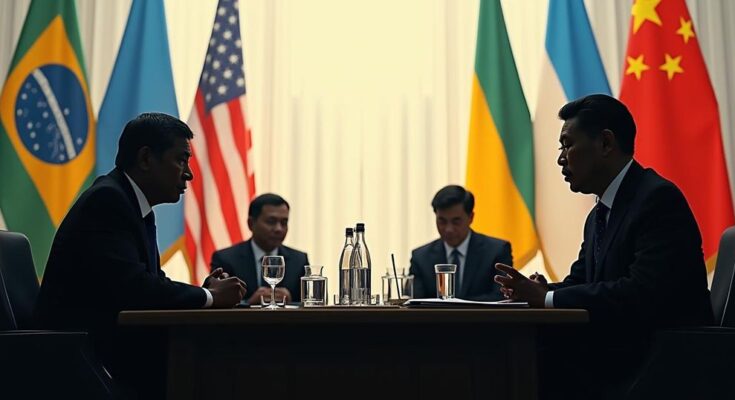China and Brazil continue to advocate for a peace plan in Ukraine, despite President Zelenskyy’s objections that it favors Russia. Meetings at the UN focused on preventing further escalation, while military tensions persist, with Russia claiming new territorial control and accusations emerging regarding arms trade with North Korea. Additionally, casualties due to ongoing military strikes and humanitarian issues remain critical aspects of the conflict dynamics.
China and Brazil have reiterated their commitment to advancing their peace initiative regarding the ongoing conflict in Ukraine, despite Ukrainian President Volodymyr Zelenskyy’s explicit rejection of the proposal, labeling it as potentially beneficial to Russian interests. On the sidelines of the United Nations General Assembly, a meeting took place with the attendance of representatives from seventeen countries, led by Chinese Foreign Minister Wang Yi and Brazilian foreign policy adviser Celso Amorim. They deliberated on crucial issues such as preventing escalation, averting the use of weapons of mass destruction, and safeguarding nuclear facilities. President Zelenskyy, speaking earlier in the assembly, criticized the alternative peace proposals from both nations, arguing that such initiatives merely create diplomatic space for Russia to perpetuate the conflict. In a subsequent statement, U.S. Secretary of State Antony Blinken voiced concerns regarding China’s involvement with Russia, implying that while China publicly aims for a resolution to the Ukraine conflict, it simultaneously enables actions by its corporations that aid in Russia’s military aggression. Furthermore, South Korea’s Foreign Minister highlighted alleged illegal arms transactions between Russia and North Korea, further complicating international tensions. Although there are moves towards peace, the conflict remains intense on the ground. Reports indicate that Russia has claimed control over the village of Marynivka in eastern Ukraine, although Ukrainian sources have contended that they have successfully repelled Russian advances in several regions. Amidst these developments, President Zelenskyy also sought to strengthen ties with the U.S. by meeting with former President Donald Trump, discussing strategies for resolving the war, while Finland has reinforced its military presence near its border with Russia as a precautionary measure. Recent military actions have resulted in casualties, with a missile strike in Kryvyi Rih causing fatalities, and incidents involving Russian drones breaching Romanian airspace contribute to escalating tensions in Eastern Europe. Additionally, a Moscow court has begun proceedings against an American national accused of mercenary activities in Ukraine, emphasizing the international legal dimensions of the conflict. In humanitarian news, nine children abducted from Ukraine have returned home thanks to intermediary efforts by Qatar.
The ongoing war in Ukraine, which commenced in February 2022 after Russia’s invasion, has given rise to widespread international concern and diplomatic endeavors aimed at achieving a peaceful resolution. Various nations and organizations are exploring different peace initiatives, notably China and Brazil, who are presenting alternatives to Ukrainian President Zelenskyy’s proposals. However, skepticism surrounding these initiatives stems from fears that they may not genuinely address the needs or sovereignty of Ukraine. This context highlights the complex interplay between notions of peace, national security, and international relations at a time of heightened military conflict.
In summary, the efforts by China and Brazil to advance their peace plan, despite opposition from Ukraine, illustrates the conflicting international narratives surrounding the war in Ukraine. With President Zelenskyy’s concerns regarding the implications of such proposals, the situation remains delicately poised as diplomatic engagements and military actions unfold simultaneously. The discussions at the United Nations and related meetings reflect a broader search for resolution amidst an increasingly challenging geopolitical landscape, while humanitarian issues continue to emerge as a pressing concern amidst the conflict.
Original Source: www.theguardian.com




